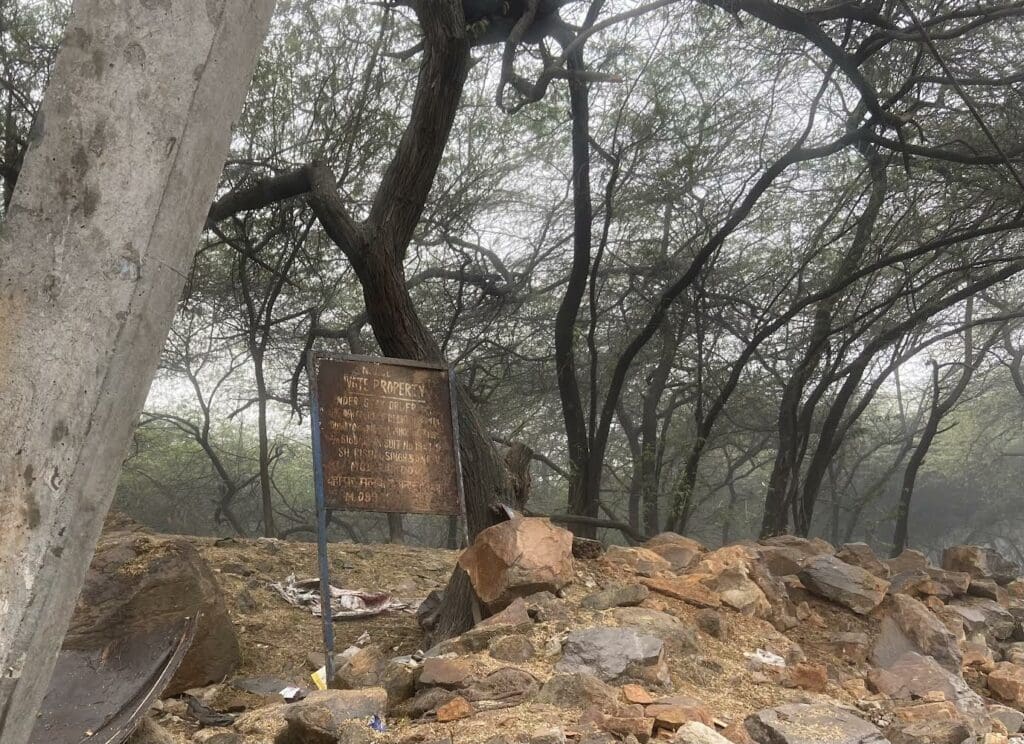
On a chilly January morning, Imam Zakir Hussain’s solemn preparations for the day’s first prayer at Masjid Akhondji were abruptly interrupted. The mosque, standing for over six centuries – housed a madrasa and a graveyard – has been a historical testament to the passage of time. However, the tranquility of this historic landmark was shattered as the Delhi Development Authority (DDA), accompanied by a heavy police presence, unexpectedly and arbitrarily demolished it.
This unforeseen act marked a seismic shift in the life of the mosque and its community. Residents and madrasa students found themselves amidst the debris, witnessing the abrupt disruption of their sacred space.
Imam Zakir Hussain, expressing his dismay, claimed, “Debris was completely removed so that people don’t get to know about the demolition.”
The DDA’s demolition drive unfolded in “secrecy”, with officials arriving at the mosque between 5-5:30 am, armed with three bulldozers and a heavy police presence, he said.
Imam Zakir, who has been Imam of the masjid for over a decade now, recounted the initial assurance that the masjid would be spared, only for the authorities to betray that trust. “They took my phone and of the people present at the incident due to which we couldn’t inform anyone on time. We were not even permitted to rescue the copies of the Qur’an [holy book of Muslims] before the demolition took place,” he said.
In Haryana’s Rohtak, Sameer Tabrez Khan, upon hearing the news, rushed from his sister’s place to Mehrauli, 53 miles away. For him, the heartbreak extended beyond the demolition; it was the desecration of his mother’s grave that added a layer of disrespect.
Tabrez found his mother’s grave open with used disposable plates scattered around. “It is disrespectful. I somehow managed to steal a glance at the graveyard; they [police] are not allowing us otherwise,” he said.
Tabrez wasn’t the sole bearer of this heart-wrenching experience. A man standing a few steps away from the crowd, consoling his sister, shared that his father’s grave had a hole near it. “The graves are surrounded by holes that reveal the bodies and shrouds of the deceased,” he said.
The community collectively questioned the morality of such actions. “They [authorities] didn’t even remove their footwear before entering the place,” they alleged.
However, this is not the first time bulldozers have demolished structures in Mehrauli. Almost a year ago, the DDA demolished several structures situated on the border of the Mehrauli Archaeological Park in Ladha Sarai village.
The Masjid Akhondji was demolished only a few months after the DDA assured the Delhi High Court it would not demolish any mosque or archival graves and other legitimate properties owned by the Delhi Waqf Board in and around the Mehrauli Archaeological Park in response to a petition by the Delhi Waqf Board.
Post the Ram Mandir inauguration, a prevailing belief among the minority population suggests that mosques are under threat due to political motives. The fear is that the demolition of mosques serves as a strategy for gaining votes, with the Bharatiya Janata Party (BJP) allegedly using religious sentiments to their advantage.
Fifty-year-old Ghulam Mustafa, a resident of Old Delhi, told Maktoob on the day of the Ram Mandir’s inauguration that the power is in the hands of the “wrong people”. He said that there is a fear that the government might potentially demolish mosques across India in the future.
“They [the government] are invoking communal violence. They [ BJP] seem focused solely on winning elections,” said Mustafa.
Over the past few years, various historical sites, notably mosques, have faced challenges from the authorities and the individuals associated with Hindu nationalist groups. In March 2019, a few local residents of Uttar Pradesh, where Ayodhya is situated, tried to inter a statue of a Hindu deity adjacent to a wall of the Gyanvapi mosque. This centuries-old mosque is situated in close proximity to the Kashi Vishwanath temple.
In November 2022, a 300-year-old mosque was demolished in Muzaffarnagar, Uttar Pradesh for road widening. In January 2023, the authorities dismantled a centuries-old mosque in Allahabad, located in the northern state of Uttar Pradesh, citing the expansion of a major road as the reason. In September 2023, four individuals were apprehended for trying to install an idol of the Hindu goddess Sarasvati within the confines of the Kamal Maula mosque in the state of Madhya Pradesh.
After the inauguration of Ram Mandir in Ayodhya, the Rashtriya Swayamsevak Sangh (RSS), the ideological parent of the Hindu-nationalist party of Prime Minister Narendra Modi stated that “several mosques in India were built over demolished Hindu temples,” toughening its stance on decades-long sectarian dispute.
The incident at Masjid Akhondji aligns with a larger pattern of authorities targeting religious structures in Delhi. In December 2023, the New Delhi Municipal Council (NDMC) issued a notice for the removal of the Sunehri Mosque at the Sunehri Bagh Road roundabout, to facilitate traffic movement.
Muzamil Salmani, a resident near the masjid, said that the demolition incident was political. He pointed fingers at the RSS and BJP, alleging an increase in religious hate over the past five years. “Everything is politics here even the demolition. DDA officials told me that they were only following the orders,” he stated. “Nothing is in their hands.”
Salmani demanded justice, expressing frustration over the lack of notice, denial of access to the masjid, and the sudden illegitimacy thrust upon the historic structure. “It is our right to receive and see the notice before the mosque’s demolition,” he said. “If the place was illegal all this while, where were the officials when more and more structures were being built there (in the mosque’s compound.”
While the authorities have blocked off the area so that the residents can visit the demolition site, Tabrez’s wish to collect some mud from his mother’s grave remains on hold. “I was yet to come over the loss of my mother and now with the mosque, they demolished her grave as well,” he said. “How will I find peace now?”



